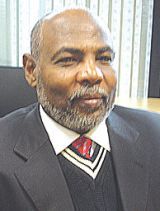Sudan says ended preparations for Darfur peacekeeping operation
December 18, 2007 (KHARTOUM) — Sudan has said ended preparations and fulfilled commitments to receive the African Union – UN peacekeeping for Darfur planed to take over from the AU troops deployed in the troubled western Sudan since 2004.

The Sudanese official said that a mechanism was set up at the Ministry of Foreign Affairs and different institutions to ease the implementation of the operation and to speed up issuance of visas and residence permits for the personnel of the hybrid operation.
He further said that the customs and port fees for hybrid operation would be exempted, adding that government mechanisms will be formed to facilitate deployment of the hybrid operation.
The UN Security Council passed a resolution on Aug. 31 calling for the deployment of 26,000 international peacekeepers to replace the 7,800 AU force in Darfur, which is suffering the lack of funds, equipment and experience.
Since the 21 December 2006 Sudan officially announced acceptance of the hybrid peacekeeping mission. However Sudanese officials repeatedly said “The hybrid operation means the logistic, technical and consultative support to be provided by the UN to the AU force in Darfur and extending it with resources and materials.”
The responsible of the hybrid force file said that Sudanese officials met recently others of the African Union and discussed importance of establishing mechanisms to emphasize the African nature of the forces and to set up a follow up office in Addis Ababa, as included in the agreement, so as to assume coordinative role for the hybrid operation.
He referred to visits to a number of countries that pledged to participate in the operation to assure their readiness to join the operation such as Egypt and Ethiopia, adding that similar visits to African countries shall continue to ascertain their readiness to participate in the hybrid operation and the number of forces and equipment.
He said that up to now these steps have not yet completed to know if there is need for non African forces. On funding for the hybrid operation, he said that this issue was discussed at the United Nations and is now at the stage of final ratification, indicating that this process was one of the causes of delay of the operation’s deployment.
He underlined that none of the additional components of the hybrid operation has arrived till now, excluding engineering elements from China, adding that other elements would arrive successively from Pakistan and Egypt.
The Undersecretary of the Ministry of Foreign Affairs denied that his government is hindering Darfur peacekeeping operation. He said that the government did not confine the participation in the hybrid operation to the African countries, referring to existence of engineering components from China and Pakistan, while planes are expected to come from non African states.
Last November, Jean-Marie Guehenno, UN peacekeeping head, has warned the world could face a choice between delaying the takeover form African force or starting the deployment with an ill-equipped force that may not be able to protect its own peacekeepers, let alone civilians. He urged Sudan to relax its opposition to non-African troops.
However Sudanese president Omer al-Beshir told the conference of the National Congress Part on November 24 .”These Swedish and Norwegian troops are not acceptable. We shall not accept them.” Speaking about a proposed Thai infantry battalion, Bashir added: “Even if there is a shortage of troops from the African continent, we are not going to accept those people. Because we were not consulted about it.”
Mutrif said that the hybrid operation will be implemented gradually and will depend on the existing African troops in Darfur, the additions that will come in the context of the light and heavy support packages, the two extra Rwandan and Nigerian battalions and other troops that would arrive from Egypt and Ethiopia, pointing out that the participation and readiness of these troops was checked in a good manner.
He said that the resolution on formation of the hybrid operation entitles its troops to use force for self defence, adding that this authorization does not prevent Sudan government to assume its responsibility for helping protection and support for the mission so as to carry out its basic task.
Mutrif said that the political, humanitarian and security aspects in the hybrid operation are integrated and linked to each other, affirming the importance of the political process.
He said that priority for participation in the hybrid operation is given to Africa and then to Asian countries, adding that there would be resort to other alternatives through the joint framework between Sudan government and the hybrid operation if sufficient forces can not be provided for any reason and in a manner that does not raise suspicion or fears.
He said that the United States is not banned to give assistance to Sudan in the fields of transport, humanitarian and political fields, stating that the priority to provide personnel is not for the United States or the European countries. He explained that the United States earlier assisted in the transport of troops and the humanitarian operation and is now helping in the political process via the special envoy of President Bush, Andrew Natsios.
UN officials, a part the non-African forces, say the need for ground transport equipment may also lead to delay to 26000 force in Darfur. The U.N. requests 18 transport helicopters and six attack helicopters.
The force is tasked with ending more than four years of bloodshed in which more than 200,000 people have died from the combined effects of war, famine and disease in Darfur while 2.2 million others have been left homeless.
(ST)
